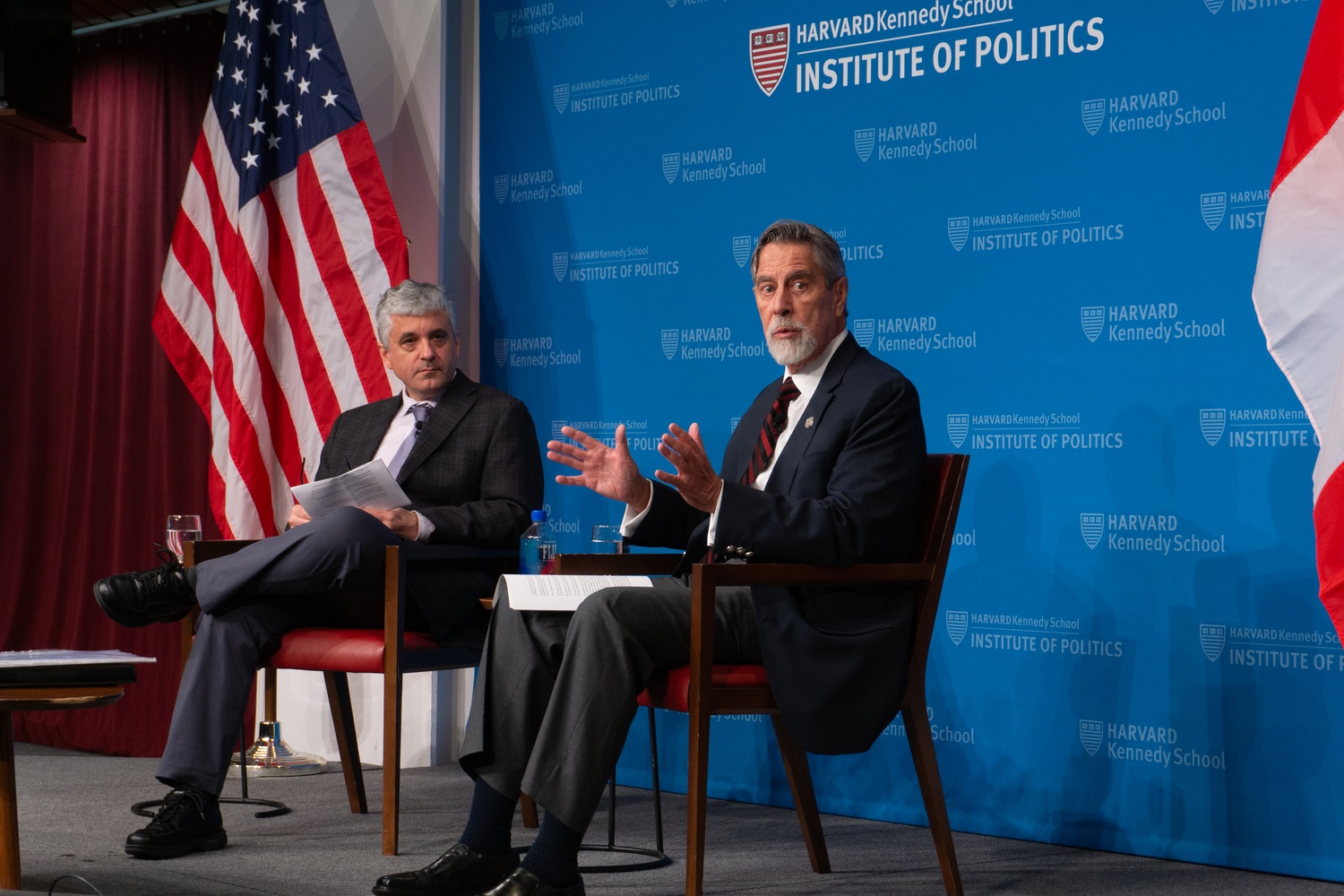
News
Harvard Researchers Develop AI-Driven Framework To Study Social Interactions, A Step Forward for Autism Research

News
Harvard Innovation Labs Announces 25 President’s Innovation Challenge Finalists

News
Graduate Student Council To Vote on Meeting Attendance Policy

News
Pop Hits and Politics: At Yardfest, Students Dance to Bedingfield and a Student Band Condemns Trump

News
Billionaire Investor Gerald Chan Under Scrutiny for Neglect of Historic Harvard Square Theater
Former Peruvian President Slams Peru’s Congress at IOP Forum, Calls for New Generation of Leaders

Former President of Peru Francisco Sagasti criticized Peru’s sitting Congress as corrupt and authoritarian at a forum hosted by the Harvard Institute of Politics on Friday evening, saying he hoped a new generation of lawmakers could introduce necessary reforms.
The discussion was moderated by Government professor Steven R. Levitsky, who directs the David Rockefeller Center for Latin American Studies at Harvard.
Sagasti described the state of Peru’s government — which is controlled by a powerful and unpopular legislature — as an “anarchical autocracy of Congress.”
Peru’s Congress has propped up the country’s equally unpopular president, Dina Boluarte, by rejecting impeachment votes against her. Many of its members face criminal investigations, and it has passed a series of laws aimed at expanding control over nongovernmental organizations, cementing its authority over Peru’s judicial branch, and limiting prosecution for war crimes.
“The first task for the new Congress will be to come in ready with about 60 to 70 bills to dismantle all the stupid things that this Congress has done,” he said, drawing scattered laughter and nods from the audience. “And for this, we need honest, intelligent, committed people that really have the common good in mind.”
But Sagasti stopped short of calling for a new constitutional convention, saying that doing so would simply exacerbate existing political divides.
“You cannot write a new constitution with the polarized climate that we have at present,” he said.
Sagasti, an engineer, international development adviser, and founder of the centrist Purple Party, served as Peru’s interim president from November 2020 to April 2021. After his departure, Peru continued to see rapid presidential turnover — with Sagasti’s successor, the leftist former schoolteacher Pedro Castillo, replaced by Boluarte after he was ousted amid a corruption scandal.
In 2022 and 2023, Boluarte’s government took a hard line against pro-Castillo protesters in Peru’s highlands, with dozens of civilians killed and hundreds injured by police and the Peruvian military. Sagasti blamed the deaths on Boluarte’s authorization of military action.
“A combination of ignorance, arrogance, authoritarian personalities create those tragedies that we should have avoided,” Sagasti said. “And are perfectly avoidable — if you know how to exercise power and authority in a democratic way and respecting human rights.”
Sagasti said dysfunction in Peru’s government was a case study in how mismanagement and short-term political interests can threaten democratic resilience.
He described the current political landscape as fragmented and unserious, saying that of the approximately 40 political parties in Peru, “only at the most, about 10 or a dozen are real political parties.”
He said that rebuilding Peru’s democracy will require not only institutional reform, but a generational shift in leadership.
“It is up to you with your generation, the younger people who are going to do that,” he told students in attendance. “Those who are in their 50s, 40s — they are too late.”
Sagasti said that limited collaboration between Latin American leaders hampered the region’s response to corruption and transnational organized crime.
“Unfortunately, the region’s collaborative arrangements are not involved,” he said. “We have presidents criticize and insult each other, which is a total miss.”
He condemned United States President Donald Trump’s blanket deportations of Venezuelans the administration has accused of being members of the Tren de Aragua gang, urging Trump to “stop demonizing Venezuelans.”
“You are not going to do anything against the Tren de Aragua, either working in the U.S. alone and deporting people, or in Peru or in Ecuador or anywhere else. You need a concerted action,” he said.
He endorsed employment programs as a strategy to divert low-income youth from gang violence and said that restoring trust in government starts with civic education, collective action, and transparency.
“You really have to wade into those swamps. But, keep clean, and it is possible,” he added.
Want to keep up with breaking news? Subscribe to our email newsletter.
From Our Advertisers

Over 300+ courses at prestigious colleges and universities in the US and UK are at your disposal.

Where you should have gotten your protein since 1998.

Serve as a proctor for Harvard Summer School (HSS) students, either in the Secondary School Program (SSP), General Program (GP), or Pre-College Program.

With an increasingly competitive Law School admissions process, it's important to understand what makes an applicant stand out.

Welcome to your one-stop gifting destination for men and women—it's like your neighborhood holiday shop, but way cooler.

HUSL seeks to create and empower a community of students who are seeking pathways into the Sports Business Industry.
